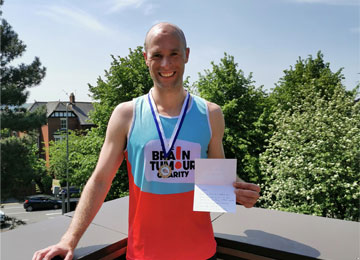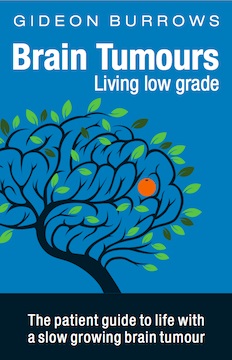Active monitoring or Watch and Wait for a brain tumour
For some low grade, slow growing tumours that are unlikely to spread, a ‘Watch and Wait’ approach may be used. This is more accurately described as the active monitoring of your condition. With active monitoring, there won’t be any immediate treatment unless your symptoms develop, or worsen, or your scan changes.
The most common types of brain tumours to receive a ‘Watch and Wait’ approach are newly diagnosed low grade gliomas (grade 1 or 2 astrocytomas, grade 2 oligodendrogliomas) and grade 1 meningiomas.
On this page, we’ll cover:
What is watch and wait, or active monitoring for brain tumours?
How does active monitoring work?
Emotional impact of active monitoring, or ‘Watch and Wait’
What is ‘Watch and Wait’ or active monitoring for brain tumours?
Brain tumours that are typically slow growing and unlikely to spread may cause no symptoms, or only a few symptoms, for many years. In this case, a ‘Watch and Wait’ or active monitoring approach may be used, rather than give treatments that can cause considerable side-effects.
Examples where this might be the case include:
- tumours with no symptoms that were discovered by accident e.g. following a scan given for ahead injury (an incidental finding)
- tumours in which the symptoms are such that you feel able to live with without them badly affecting your quality of life e.g. seizures that are being well-controlled by anti-epilepsy drugs
- the tumour is growing in an area that’s difficult to operate on and possible treatments will cause more harm than doing nothing
- you don’t want to have surgery or other treatments.
Active monitoring is also sometimes used after initial treatment, such as biopsy or debulking surgery, where part of the tumour is removed, before giving other treatments that could cause worse side-effects.
How does active monitoring work?
If you’re on ’Watch and Wait’, you’ll see your specialist for regular check-ups/MRI scans. Having MRI (Magnetic Resonance Imaging) scans means that the size and features of your tumour can be very accurately monitored and compared over time. These can vary in frequency, from every few months to every couple of years.
You might begin treatment if:
- there’s a marked increase in tumour size
- you develop symptoms, or worsening of symptoms, that badly affect your quality of life
e.g. uncontrollable seizures - the tumour becomes a higher grade (starts growing more quickly).
Depending on your tumour and age, this could take many years, or not happen at all.

I utilised my hobbies, such as running, which helped my mental health and allowed me to de-stress.

Andrew Dean-Young, diagnosed with a grade 3 anaplastic astrocytoma brain tumour in 2016
“I was out for a run when suddenly I woke up on the floor, with complete memory loss of the past half an hour. I was taken to the hospital where a shadow was found on my brain, and following subsequent scans, I was told I had a brain tumour.
“I received treatment for 10 months, as well as undergoing surgery, but due to the type of tumour I had, I was told I had to ‘watch and wait’ as often, similar tumours are likely to return within five years.
“Nevertheless, I utilised my hobbies, such as running, which helped my mental health and allowed me to de-stress. Going to local comedy shows also allowed me to heal, as ‘laughter is always the best medicine.’
I feel lucky that my work hasn’t been too affected, and I’m still able to work full time. I’m determined to make the most of my life now, and short term goals of mine include climbing Mount Snowdon for the first time, running 10k races to raise money for charity and releasing a new novel. I’m also an avid reader and use it as a way to relax. I’m so thankful for my support group – talking to people is vital and a great cure.“
Join one of our Online Support Communities for more stories and tips about coping with a brain tumour diagnosis from people who know what you’re going through.
Emotional impact of active monitoring, or ‘Watch and Wait’
Being told that you have a brain tumour, but no active treatment will be given until it grows bigger, or becomes more aggressive, can be very frightening. The time between appointments can also seem (or be) long.
People who’ve been put on active monitoring have told us about what they have found to help. These include:
- learn more about your tumour and the support that’s available – it can make you feel more in control
- learn more about available treatment options before you have to make any decisions about how you want to proceed
- ask how far apart your appointments will be – so you know what to expect – and whether there’s a named contact
- ask your health team for advice about when to contact a healthcare professional with regard to new or changing symptoms
- keep a notebook in which you can write any questions that you have for your next appointment. Write them down as they come to mind
- keep your own files of every appointment and what was discussed
- talk to your family and friends – about the risks and benefits and how you’re feeling
- speak to others in the same situation – we have several online support communities that you can access from anywhere in the world and at any time. You can ‘meet’ other brain tumour patients and carers and discuss your worries or fears and share ideas
- consider whether talking to a professional counsellor could help. We run a free counselling service for people affected by a brain tumour.
By joining one of our Online Support Communities, you can get more tips about living with or beyond a brain tumour diagnosis from people who truly understand what you’re going through.
Support and Information Services
Research & Clinical Trials Information
You can also join our active online community.
In this section

Get support
If you need someone to talk to or advice on where to get help, our Support and Information team is available by phone, email or live-chat.
Recommended reading
Share your experiences and help create change
By taking part in our Improving Brain Tumour Care surveys and sharing your experiences, you can help us improve treatment and care for everyone affected by a brain tumour.

Brain Tumours: Living Low Grade by Gideon Burrows
The patient guide to living with a slow growing tumour. Read more about his experiences and those of many others as they came to understand their diagnosis and learned how to live low grade.

